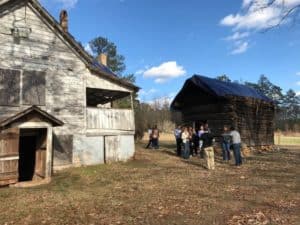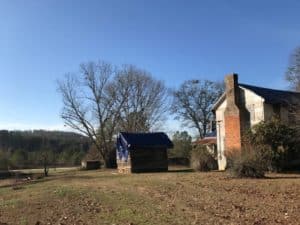Preservation in Progress – Lyon Farmhouse

Stabilization work on the historic Lyon Farmhouse, part of the Arabia Mountain National Heritage Area, will begin in late October 2018. This work will secure the aging structure and open the door to future education and conservation programs at the site.

Members from the Alliance of National Heritage Areas tour the historic Lyon Farm in early January 2017.
Initially built in the 1820’s (and then expanded in 1853 and again in 1893), the Lyon Farmhouse is one of the oldest homesteads remaining in DeKalb County. It was purchased by the DeKalb County Department of Watershed Management (DWM) in 2006. By 2016, a worsening state of disrepair resulted in its placement on the Georgia Trust’s “Places in Peril” list, following which the Dekalb County Board of Commissioners unanimously authorized funds to begin the stabilization of the farmhouse. An extensive survey of the house and surrounding property identified ways to stabilize the site. Repairs will predominately involve stabilization of the foundation and rotten framing, as well as roof replacement.
The Lyon Farm has been identified as a future site for tourism and youth education around DeKalb County history. Connected to the broader Arabia Mountain National Heritage Area, it will eventually tie directly into Atlanta’s Beltline through the Arabia Mountain PATH, a multi-use trail currently 33 miles long. Once revitalized, the Farmhouse will connect greater Dekalb’s urban and suburban present with its rural past.
The Atlanta office of F.H. Paschen is the lead contractor for stabilization. Overall project costs for this phase are $225,000 and initial repairs should be completed in March 2019. To follow the progress of this project, please visit our blog.
About the Lyon Farmhouse: One of the oldest houses in DeKalb County, the Lyon Farmhouse was built by Joseph Emmanuel Lyon, a former British soldier who was awarded 100 acres for taking the Oath of Allegiance after being captured and serving with the patriots during the American Revolution. Lyon originally built a log cabin on the property in the 1820s. It was expanded in 1853 and again in 1893, creating the structure that stands today. Built in a vernacular architecture style, the house and various outbuildings reflect a self-sustaining farm where cultivating cotton, apples, muscadines, pears, lemons, sorghum, and bees were a part of life. The homestead is the last remaining intact farm of what once made up the agricultural area called Flat Rock.
